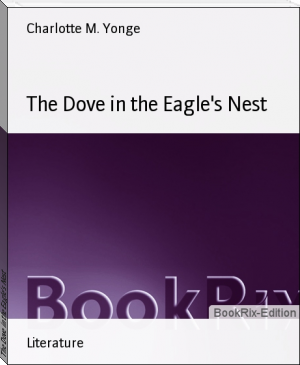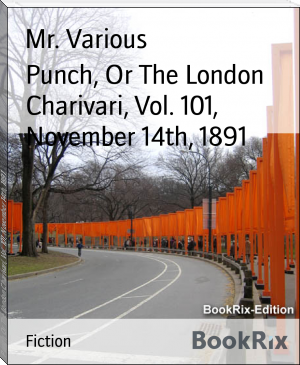The Dove in the Eagle's Nest, Charlotte M. Yonge [i want to read a book txt] 📗

- Author: Charlotte M. Yonge
Book online «The Dove in the Eagle's Nest, Charlotte M. Yonge [i want to read a book txt] 📗». Author Charlotte M. Yonge
“Look you!” said Ebbo, turning sharply. “If Schlangenwald be a godless ruffian, pitiless alike to soul and body, is that a cause that I should stain myself too?”
“It were true vengeance,” growled Koppel.
“And now,” grumbled Ulrich, “will my lady hear, and there will be feeble pleadings for the vermin’s life.”
Like mutterings ensued, the purport of which was caught by Friedel, and made him say to Ebbo, who would again have escaped the disagreeableness of the scene, “We had better tarry at hand. Unless we hold the folk in some check there will be no right execution. They will torture him to death ere the priest comes.”
Ebbo yielded, and began to pace the scanty area of the flat rock where the need-fire was wont to blaze. After a time he exclaimed: “Friedel, how couldst ask me? Knowst not that it sickens me to see a mountain cat killed, save in full chase. And thou—why, thou art white as the snow crags!”
“Better conquer the folly than that he there should be put to needless pain,” said Friedel, but with labouring breath that showed how terrible was the prospect to his imaginative soul not inured to death-scenes like those of his fellows.
Just then a mocking laugh broke forth. “Ha!” cried Ebbo, looking keenly down, “what do ye there? Fang and hang may be fair; fang and torment is base! What was it, Lieschen?”
“Only, Herr Freiherr, the caitiff craved drink, and the fleischerinn gave him a cup from the stream behind the slaughter-house, where we killed the swine. Fit for the like of him!”
“By heavens, when I forbade torture!” cried Ebbo, leaping from the rock in time to see the disgusting draught held to the lips of the captive, whose hands were twisted back and bound with cruel tightness; for the German boor, once roused from his lazy good-nature, was doubly savage from stolidity.
“Wretches!” cried Ebbo, striking right and left with the back of his sword, among the serfs, and then cutting the thong that was eating into the prisoner’s flesh, while Friedel caught up a wooden bowl, filled it with pure water, and offered it to the captive, who drank deeply.
“Now,” said Ebbo, “hast ought to say for thyself?”
A low curse against things in general was the only answer.
“What brought thee here?” continued Ebbo, in hopes of extracting some excuse for pardon; but the prisoner only hung his head as one stupefied, brutally indifferent and hardened against the mere trouble of answering. Not another word could be extracted, and Ebbo’s position was very uncomfortable, keeping guard over his condemned felon, with the sulky peasants herding round, in fear of being balked of their prey; and the reluctance growing on him every moment to taking life in cold blood. Right of life and death was a heavy burden to a youth under seventeen, unless he had been thoughtless and reckless, and from this Ebbo had been prevented by his peculiar life. The lion cub had never tasted blood.
The situation was prolonged beyond expectation.
Many a time had the brothers paced their platform of rock, the criminal had fallen into a dose, and women and boys were murmuring that they must call home their kine and goats, and it was a shame to debar them of the sight of the hanging, long before Hans came back between crying and stammering, to say that Father Jodocus had fallen into so deep a study over his book, that he only muttered “Coming,” then went into another musing fit, whence no one could rouse him to do more than say “Coming! Let him wait.”
“I must go and bring him, if the thing is to be done,” said Friedel.
“And let it last all night!” was the answer. “No, if the man were to die, it should be at once, not by inches. Hark thee, rogue!” stirring him with his foot.
“Well, sir,” said the man, “is the hanging ready yet? You’ve been long enough about it for us to have twisted the necks of every Adlerstein of you all.”
“Look thee, caitiff!” said Ebbo; “thou meritest the rope as well as any wolf on the mountain, but we have kept thee so long in suspense, that if thou canst say a word for thy life, or pledge thyself to meddle no more with my lands, I’ll consider of thy doom.”
“You have had plenty of time to consider it,” growled the fellow.
A murmur, followed by a wrathful shout, rose among the villagers. “Letting off the villain! No! No! Out upon him! He dares not!”
“Dare!” thundered Ebbo, with flashing eyes. “Rascals as ye are, think ye to hinder me from daring? Your will to be mine? There, fellow; away with thee! Up to the Gemsbock’s Pass! And whoso would follow him, let him do so at his peril!”
The prisoner was prompt to gather himself up and rush like a hunted animal to the path, at the entrance of which stood both twins, with drawn swords, to defend the escape. Of course no one ventured to follow; and surly discontented murmurs were the sole result as the peasants dispersed. Ebbo, sheathing his sword, and putting his arm into his brother’s, said: “What, Friedel, turned stony-hearted? Hadst never a word for the poor caitiff?”
“I knew thou wouldst never do the deed,” said Friedel, smiling.
“It was such wretched prey,” said Ebbo. “Yet shall I be despised for this! Would that thou hadst let me string him up shriftless, as any other man had done, and there would have been an end of it!”
And even his mother’s satisfaction did not greatly comfort Ebbo, for he was of the age to feel more ashamed of a solecism than a crime. Christina perceived that this was one of his most critical periods of life, baited as he was by the enemy of his race, and feeling all the disadvantages which heart and conscience gave him in dealing with a man who had neither, at a time when public opinion was always with the most masterful. The necessity of arming his retainers and having fighting men as a guard were additional temptations to hereditary habits of violence; and that so proud and fiery a nature as his should never become involved in them was almost beyond hope. Even present danger seemed more around than ever before. The estate was almost in a state of siege, and Christina never saw her sons quit the castle without thinking of their father’s fate, and passing into the chapel to entreat for their return unscathed in body or soul. The snow, which she had so often hailed as a friend, was never more welcome than this winter; not merely as shutting the enemy out, and her sons in, but as cutting off all danger of a visit from her suitor, who would now come armed with his late sufferings in her behalf; and, moreover, with all the urgent need of a wise and respected head and protector for her sons. Yet the more evident the expediency became, the greater grew her distaste.
Still the lonely life weighed heavily on Ebbo. Light-hearted Friedel was ever busy and happy, were he chasing the grim winter game—the bear and wolf—with his brother, fencing in the hall, learning Greek with the chaplain, reading or singing to his mother, or carving graceful angel forms to adorn the chapel. Or he could at all times soar into a minstrel dream of pure chivalrous semi-allegorical romance, sometimes told over the glowing embers to his mother and brother. All that came to Friedel was joy, from battling with the bear on a frozen rock, to persuading rude little Hans to come to the Frau Freiherrinn to learn his Paternoster. But the elder twin might hunt, might fence, might smile or kindle at his brother’s lay, but ever with a restless gloom on him, a doubt of the future which made him impatient of the present, and led to a sharpness and hastiness of manner that broke forth in anger at slight offences.
“The matron’s coif succeeding the widow’s veil,” Friedel heard him muttering even in sleep, and more than once listened to it as Ebbo leant over the battlements—as he looked over the white world to the gray mist above the city of Ulm.
“Thou, who mockest my forebodings and fancies, to dwell on that gipsy augury!” argued Friedel. “As thou saidst at the time, Wildschloss’s looks gave shrewd cause for it.”
“The answer is in mine own heart,” answered Ebbo. “Since our stay at Ulm, I have ever felt as though the sweet motherling were less my own! And the same with my house and lands. Rule as I will, a mocking laugh comes back to me, saying: ‘Thou art but a boy, Sir Baron, thou dost but play at lords and knights.’ If I had hung yon rogue of a reiter, I wonder if I had felt my grasp more real?”
“Nay,” said Friedel, glancing from the sparkling white slopes to the pure blue above, “our whole life is but a play at lords and knights, with the blessed saints as witnesses of our sport in the tilt-yard.”
“Were it merely that,” said Ebbo, impatiently, “I were not so galled. Something hangs over us, Friedel! I long that these snows would melt, that I might at least know what it is!”
CHAPTER XVIIBRIDGING THE FORD
The snow melted, the torrent became a flood, then contracted itself, but was still a broad stream, when one spring afternoon Ebbo showed his brother some wains making for the ford, adding, “It cannot be rightly passable. They will come to loss. I shall get the men together to aid them.”
He blew a blast on his horn, and added, “The knaves will be alert enough if they hope to meddle with honest men’s luggage.”
“See,” and Friedel pointed to the thicket to the westward of the meadow around the stream, where the beech trees were budding, but not yet forming a full mass of verdure, “is not the Snake in the wood? Methinks I spy the glitter of his scales.”
“By heavens, the villains are lying in wait for the travellers at our landing-place,” cried Ebbo, and again raising the bugle to his lips, he sent forth three notes well known as a call to arms. Their echoes came back from the rocks, followed instantly by lusty jodels, and the brothers rushed into the hall to take down their light head-pieces and corslets, answering in haste their mother’s startled questions, by telling of the endangered travellers, and the Schlangenwald ambush. She looked white and trembled, but said no word to hinder them; only as she clasped Friedel’s corslet, she entreated them to take fuller armour.
“We must speed the short way down the rock,” said Ebbo, “and cannot be cumbered with heavy harness. Sweet motherling, fear not; but let a meal be spread for our rescued captives. Ho, Heinz, ’tis against the Schlangenwald rascals. Art too stiff to go down the rock path?”
“No; nor down the abyss, could I strike a good stroke against Schlangenwald at the bottom of it,” quoth Heinz.
“Nor see vermin set free by the Freiherr,” growled Koppel; but the words were lost in Ebbo’s loud commands to the men, as Friedel and Hatto handed down the weapons to them.
The convoy had by this time halted, evidently to try the ford. A horseman crossed, and found it practicable, for a waggon proceeded to make the attempt.
“Now is our time,” said Ebbo, who was standing on the narrow ledge between the castle and the precipitous path leading to the meadow. “One waggon may get over, but the second or third will stick in the ruts that it leaves. Now we will drop from our crag, and if the Snake falls on them, why, then for a pounce of the Eagle.”
The two young knights, so goodly in their bright steel, knelt for their mother’s blessing, and then sprang like chamois down the ivy-twined steep, followed by their men, and were lost to sight among the bushes and rocks. Yet even while her frame quivered with fear, her heart swelled at the thought what a gulf there was between these days and those when she had hidden her face in despair, while Ermentrude watched the Debateable Ford.
She watched now in suspense, indeed, but with exultation instead of shame, as two waggons safely crossed; but the third stuck fast, and presently turned over in the stream, impelled sideways by the efforts of the struggling horses. Then, amid endeavours to disentangle the animals and succour the driver, the travellers were attacked by a party of armed men, who dashed out of the beechwood, and fell on the main body of the waggons, which were waiting on the bit of bare shingly soil that lay between the new and old channels. A wild mêlée was all that Christina could see—weapons raised, horses starting, men rushing from the river, while the clang and the shout rose even to the castle.
Hark! Out rings the clear call, “The Eagle to the rescue!” There they speed over the meadow, the two slender forms with glancing helms! O overrun not the followers, rush not into needless danger! There is Koppel almost up with





Comments (0)